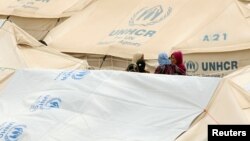The U.N.’s top diplomat in Iraq is warning that the expected military operation to liberate the city of Mosul from Islamic State fighters could become the world’s biggest humanitarian crisis.
“OCHA [UN Office for the Coordination of Humanitarian Affairs] estimates that the Mosul operation will be the largest and most sensitive humanitarian crisis in the world in 2016,” Iraq envoy Jan Kubis told the U.N. Security Council in a briefing on Friday. Mosul is Iraq’s second largest city.
He said a U.N. aid appeal for $861 million stands at less than 40 percent funded, and a reallocation of existing resources is urgently required, not just to meet current emergency needs, but for those anticipated for the Mosul liberation campaign.
“The [Mosul] humanitarian effort could cost as much as $1 billion,” Kubis warned.
Iraq is already classified as a Level 3 emergency — the highest crisis category. Currently, the U.N. estimates more than 10 million Iraqis require some form of humanitarian assistance — including the 3.4 million people who have been displaced since the rise of the self-styled Islamic State began in 2014.
Next week in Washington, a donors conference is planned in support of Iraq.
Military campaign
The U.S. announced Monday it would send 560 more troops to Iraq, many to be positioned near Mosul in an effort to retake the largest city under IS control. Washington has also been training Iraqi forces to carry out the campaign.
Iraq’s U.N. Ambassador Mohamed Ali Alhakim told the Security Council that his government and the international coalition have liberated 60 percent of territory held by Islamic State.
“We are also working to prepare for the liberation of Mosul; certain operations have already begun.” He said some villages have already been retaken in the initial phase.
Alhakim said that across Iraq some 700,000 residents have returned to areas liberated from IS and other armed groups.
Last month, Iraqi troops with international support, liberated the city of Fallujah in Anbar province from more than two years under IS control.
Some 85,000 residents then fled the city, overwhelming camps for the displaced and requiring a massive humanitarian response. Many arrived to safety in terrible condition, after months of food shortages and a lack of clean drinking water and medicines.




